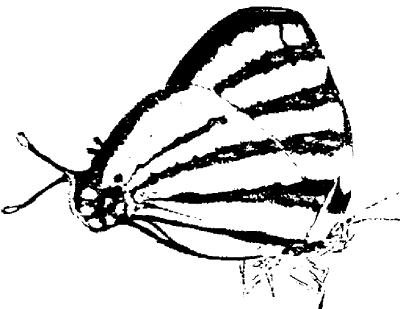 |
Science Frontiers ONLINE No. 20: Mar-Apr 1982 |
|
|
Heads or tails?
Fake-head butterflies often escape predators that make passes at their cleverly designed tails, which as the figure shows, look awfully like butterfly heads, with eye spot, fake antennas, etc. Further, the converging stripes direct attention to the false head. The result is that this type of butterfly may lose its tail but save its real head. This effective stripe pattern has evolved (?) independently at least six times in the Neotropics.
(Robbins, Robert K.; "The 'False Head' Hypothesis: Predation and Wing Pattern Variation of Lycaenid Butterflies," American Naturalist, 118:770, 1981.)
Comment. One wonders why all butterflies haven't evolved this neat ploy?
